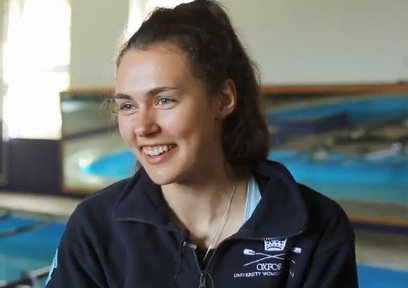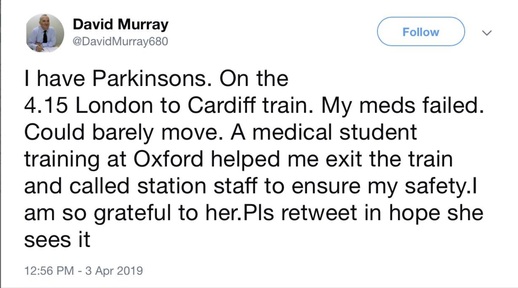Man with Parkinson's 'frozen' on train reunites with heroic stranger
A man whose Parkinson’s medication failed, leaving him standing up ‘frozen’ on a train to Cardiff, has been reunited with the mystery passenger who came to his aid, after his Twitter appeal to find her went viral.

David Murray, aged 75, was travelling back to Cardiff on the 4.15pm train from London when his Parkinson’s medication failed as he stood up to get off the train, leaving him suddenly unable to move. It was then that a stranger helped him off the train to meet his wife at Cardiff station.
His Twitter plea to find the Oxford University medical student to thank her, soon went viral and was shared 27,000 times and liked 45,000 times.
He wrote on Twitter (@DavidMurray680): 'I have Parkinsons. On the 4:15 London to Cardiff train. My meds failed. Could barely move. A medical student training at Oxford helped me exit the train and called station staff to ensure my safety. I am so grateful to her. Pls retweet in hope she sees it.'
Mr Murray’s Twitter appeal led to the university's Oxford Medicine Admissions (@OxfordA100) replying 'Our students often reaffirm faith in humanity; we’ll do what we can to ensure this act of kindness is recognised!'
The university’s Medical Sciences department soon announced it was their fourth year student Rebecca te Water Naude who had helped Mr Murray. The University College Oxford student was part of the Oxford crew for the 2017 university boat race.

Rebecca te Water said: ‘When I saw David he was standing up, frozen, just a few minutes away from Cardiff where I was getting off so I asked him if he was okay.
‘He told me he had Parkinson’s and his medication had stopped working, so I offered to help him get off the train. ‘We chatted about what he had been up to and I told him as a medical student, I was interested in Parkinson’s.
‘When the train stopped I helped him get onto the platform, where we asked the station staff for a wheelchair so he could go and meet his wife. ‘It really was just the natural thing to do, and when I saw the tweet I was mostly just pleased to hear he got home safely.’
While his tweet prompted a huge response, with many impressed by the human kindness shown, others expressed concern that a lack of staff on board trains made disabled passengers particularly vulnerable.
Lack of dopamine can cause body to 'freeze'
The retired Age Concern chief was on the train after attending a meeting at the Cure Parkinson's Trust, where he is a patient advocate and a trustee.

Despite taking his medication on the train, Mr Murray found he could barely move.
Parkinson's disease is caused by a loss of nerve cells in part of the brain. This leads the brain not producing enough of the chemical dopamine, which controls movement.
A lack of dopamine can cause some people with Parkinson's to experience motor symptoms such as tremor, slowness and freezing, which can all worsen over time according to the charity Parkinson’s UK.
Freezing in particular can lead to falls, putting people at risk of seriously injury and can have long-lasting effects on their confidence and quality of life.
Approximately 1 in 500 people are affected by Parkinson's disease - an estimated 127,000 people in the UK with the condition.
Recent results from a trial of spinal cord stimulation (conducted in Ontario, Canada) found that electrical stimulation of the spinal cord improved walking and freezing in participants, even after the therapy was stopped.
A device that was surgically implanted electrically stimulated the lower spinal cord over a one to four-month period.
The results from the study, which involved five people with Parkinson's, were published in the scientific journal, Movement Disorders and found the therapy had significantly reduced the average number of freezing episodes patients experienced during the study.
The researchers are now planning a larger clinical trial involving 25 people with Parkinson's; the results of which are expected in 2020.
’Parkinsons won’t stop me from enjoying the best things in life'

Dr Beckie Port, research communications manager at the charity Parkinson's UK, said: "Should future studies show the same level of promise, it has the potential to dramatically improve quality of life, giving people with Parkinson's the freedom to enjoy everyday activities like going for a walk."
Mr Murray, a father of six, was diagnosed with Parkinson’s 12 years ago.
He has described his Parkinson’s medication as unreliable but he says he will not let Parkinson’s or medication failures stop him from getting out and about, being a 'patient advocate' or doing anything else he loves.
After relaxing over the Easter bank holiday heatwave, David Murray tweeted: '#parkinsons won’t stop me from enjoying the best things in life…..a family BBQ on a sunny day.'
Latest Features News
 28-Nov-19
2019 Election: Labour pledges £10.8 bn for free personal care while Boris Johnson sidelines social care
28-Nov-19
2019 Election: Labour pledges £10.8 bn for free personal care while Boris Johnson sidelines social care
 18-Oct-19
Podcast: Wendy Mitchell and dementia: 'My biggest fear is not knowing who my daughters are'
18-Oct-19
Podcast: Wendy Mitchell and dementia: 'My biggest fear is not knowing who my daughters are'
 30-Sep-19
World's oldest diver aged 96 says 'never accept the fact you are getting old'
30-Sep-19
World's oldest diver aged 96 says 'never accept the fact you are getting old'
 27-Sep-19
Exclusive: Care minister backs care workers' call for time off to grieve and attend funerals
27-Sep-19
Exclusive: Care minister backs care workers' call for time off to grieve and attend funerals
 20-Sep-19
Podcast: Gyles Brandreth urges care workers to learn poetry with elderly
20-Sep-19
Podcast: Gyles Brandreth urges care workers to learn poetry with elderly